
Understanding Home Values: Assessed Value vs. Market Value
As a homeowner or potential buyer, grasping the difference between assessed value and market value is essential for making informed decisions regarding property taxes and real estate transactions. These values, often used interchangeably, represent different aspects of property valuation.
The Basics: What is Assessed Value?
The assessed value is primarily used for property tax calculations and is determined by local governments. Tax assessors evaluate properties based on factors such as size, location, and condition, frequently reassessing them every few years. This value serves as the foundation for your property tax bill, meaning a higher assessed value could lead to higher taxes, significantly impacting your finances.
What is Market Value and Why Does it Matter?
On the other hand, market value is the price a property is expected to sell for in the current market. Its determination involves recent sales of comparable homes, reflecting real-time demand and market conditions. For potential sellers or investors, understanding market value is vital, as it aids in setting a competitive asking price or evaluating potential refinancing options. In a bustling real estate market, knowing your property’s market value can give you an advantage during negotiations.
Why Understanding These Values is Important for Homeowners
For homeowners in the home improvement sector, distinguishing between these two values can help refine marketing strategies or guide renovations. Understanding the assessed value's impact on property taxes can assist in long-term financial planning, whereas leveraging market value insights can lead to more strategic decisions in renovations intended to increase the home's resale value.
Conclusion: Making Informed Home Decisions
By comprehending the differences between assessed and market values, homeowners can better navigate their financial landscapes. Whether you're considering selling, buying, or renovating, these insights will prove valuable. Always remember that the property value landscape is ever-evolving, and staying informed helps you stay ahead. Stay proactive and make informed decisions!
 Add Row
Add Row  Add
Add 




Write A Comment